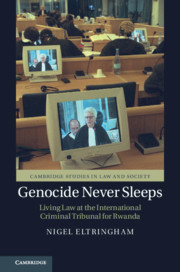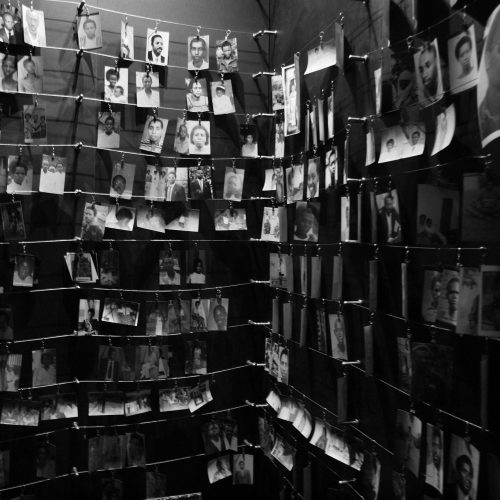 Genocide Never Sleeps is an in-depth analysis of the inner workings of the contested terrain of international criminal law from an anthropological perspective. Targeting a broad audience that includes legal scholars, practitioners, and NGO workers, and drawing on extensive ethnographic research conducted at the International Criminal Tribunal for Rwanda (ICTR), the book offers an excellent example of how anthropologists can contribute to international justice.
Genocide Never Sleeps is an in-depth analysis of the inner workings of the contested terrain of international criminal law from an anthropological perspective. Targeting a broad audience that includes legal scholars, practitioners, and NGO workers, and drawing on extensive ethnographic research conducted at the International Criminal Tribunal for Rwanda (ICTR), the book offers an excellent example of how anthropologists can contribute to international justice.
Nigel Eltringham, who previously had conducted research on the Rwandan genocide among Rwandan living in Rwanda and Europe, shifts his focus on the “powerful”. Demystifying “the Trial” and the international criminal court, he shows us how international criminal law operates on the ground and is created, re-created, negotiated, and modified by individual legal actors and extra-legal forces. Going beyond speech and discourse-centered courtroom ethnography, Genocide Never Sleeps brilliantly demonstrates how processes of law-making cannot be thought independently of the non-verbal, non-textual, hidden scripts and unwritten laws. Offering flesh-and-blood accounts of diverse legal practitioners, the book argues that the law and legal institutions are not firmly established, and the legal practitioners— not even those who serve in a trial against a horrific crime like genocide— don’t share the same set of values, aspirations, and motivations while practicing international criminal law.
As Eltringham rightly points out, five decades after the anthropologist Laura Nader’s call for “studying up” (1969), ethnographic studies of the ruling elites and institutions are still limited in number, especially those of the Global North. Although much of Eltringham’s research took place at the ICTR in Arusha, Tanzania, Genocide Never Sleeps provides us hard to reach ethnographic insight into cosmopolitan legal elites in an international environment. Such insight is of enormous importance not only to the socio-legal scholars and legal anthropologists who seek to understand the operations and effects of international criminal law but also to civil society actors and human rights activists who want to mobilize the international criminal court. In other words, the rich ethnographic accounts of the sometimes conflictual, yet at other times congenial and transformative encounters among diverse actors in the courtroom— the persecutors, lawyers, witnesses, and simultaneous interpreters—shed not only analytical light into how the international criminal court works in practice but also provide significant food for thought for activists interested in supporting the cause of the persecuted and in aiding them by utilizing international criminal law.
Eltringham’s monograph successfully demystifies international law by showing its human made-ness and demonstrates how processes of law-making cannot be thought independently of the non-verbal, non-textual, hidden scripts and unwritten laws
The book’s analysis of the encounters between the Rwandan witnesses and diverse legal actors offers an excellent example of how anthropologists, as cultural translators, can contribute to international justice. As Eltringham shows in Chapter 4 and as other anthropologists (eg. Merry, 2003) have also underlined, legal actors tend to “demonize” the cultures of historically racialized, persecuted, and dispossessed populations. The culture of such communities, in this specific case, of Rwandans, is often considered as a “key impediment.” Eltringham demonstrates that in line with the long-enduring racist portrayals of African people as “ignorant”, “devious,” or “incapable,” many European legal actors who served in the court have perceived Rwandan witnesses and their testimonies as untrustworthy and deceptive.
While the alleged “cultural incapacity” of the Rwandan witnesses was seen as an obstacle to the operation of the court, by turning the anthropological gaze towards those who hold relatively powerful positions, the book demonstrates how such perceptions of Africans decrease the reliability of witnesses’ statements. Testimony takers’ ignorance of the culture-specific uses of certain concepts and measures, lawyers’ repackaging of the testimonies, infiltration of government spies, reconstruction of witnesses’ narratives without the information of the witnesses: these all constrained the court’s capacity to hear witnesses’ voices. By unfolding how a “legal culture” affects the operations and implementation of international criminal law, the book offers invaluable information to those who want to employ the law in service of justice, however distant and unattainable it is.
In sum, Genocide Never Sleeps, with its meticulous and nuanced analysis of the inner workings of the ICTR, and vivid examination of diverse actors who fill the courtroom, is a significant contribution to the literature on the production and practice of the international criminal law. Successfully demystifying international law by showing its human made-ness, Eltringham’s monograph should be a must-read for students of law and society studies (including legal anthropologists) interested in the craft of law making. Genocide Never Sleeps should also be a must-read for transnational legal activists and human rights workers, who are concerned with improving the effectiveness of international legal instruments.
Eltringham, Nigel.(2019). Genocide Never Sleeps. Cambridge University Press. ISBN: 9781108757195
References
Nader, L. (1969). “Up the anthropologist—perspectives gained from studying up.” In Reinventing Anthropology (ed) D. Hymes. New York: Pantheon Books.
Merry, S. E. (2003). “Human rights law and the demonization of culture (and anthropology along the way).” PoLAR (26).
Featured Image: Photos of victims of the Genocide, at the Genocide Memorial in Kigali. Photo (cropped) by Andy, Flickr, CC BY-NC-SA 2.0
*****
This review is a response to our call for reviews on Law, Technology and Bureaucracy. We have already published another review for Genocide Never Sleeps, as well as one for Dispossessed, for Uberland, for The Gray Zone and for Sentiment, Reason and Law.



